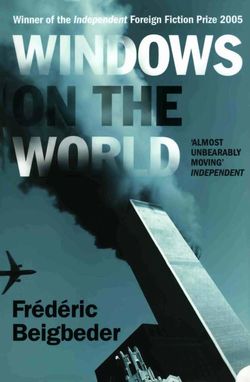Читать книгу Windows on the World - Frédéric Beigbeder - Страница 21
8:44
ОглавлениеIf they could carefully study the photos they’re taking (photos that will never be developed), behind the Empire State Building, Jerry and David would notice a white dot moving on the horizon. Like a dazzling white gull against the blue skyline. But birds don’t fly this high, nor this fast. Sunlight ricochets off the silver shape like when one of the FBI guys in Mission Impossible flashes a mirror in his partner’s eyes to silently signal to him.
In Le Ciel de Paris, everything is designed to constantly remind you that you are higher that the normal. Even in the restrooms, the walls with the urinals depict the skyline of the City of Light, so that male customers can piss all over it.
I should come back and have dinner here: the menu is pretty tempting. “Autumn in Le Ciel de Paris as interpreted by Jean-François Oyon and his team”: among the appetizers is Seared foie gras on pain d’épices with a cream of ceps (€25.50); fish dishes include Fillet of grey mullet à la plancha with a bouillabaisse reduction and eggplant remoulade (€26.00); if you prefer meat, Jean-François Oyon suggests Pigeon roasted in honey and spices with caramelized cabbage (€33.00). For dessert I’d be tempted to go for the Luxurious warm, chocolate “Guanaja” with hazelnut cream ice. I realize it’s hardly good for your health—Karl Lagerfeld would disapprove—but I prefer something luxurious to the Tonka and morello cherry surprise or even the Roasted figs with Bourbon vanilla butter.
Behind me, a terrible drama is unfolding: an American couple are demanding ham and eggs with mushrooms for their breakfast, but the waitress in her orange uniform says, “I’m sorry, nous ne servons que du continental breakfast.” A repast composed of toast, croissants or pains au chocolat, fruit juice and coffee, the continental breakfast is rather less substantial than the breakfast Americans are accustomed to ingesting in the mornings. Accordingly, they stand up, cursing loudly, and walk out of the restaurant. They can’t understand how such a touristy place can be incapable of serving a decent, ample breakfast. From a strictly commercial viewpoint, they’re not wrong. But what’s the point in traveling if it’s to eat the same things you eat at home? In fact, it’s a terrible misunderstanding—everyone is right. Le Ciel de Paris should give its customers a choice, offer as wide a selection at breakfast as they do at dinner. And Americans should stop trying to export their lifestyle to the entire planet. That said, that’s two people who would survive if an airplane did crash into the Tour Montparnasse at 8:46 this morning, as it did into the North Tower of the World Trade Center on September 11,2001.
What is staggering is that a plane had already flown into a New York skyscraper. On a foggy night in 1945, an American B-52 bomber crashed into the Empire State Building between floors 78 and 79. Fourteen dead and a colossal inferno several hundred feet high. But the Empire State did not collapse because the building’s steel structure did not buckle as the World Trade Center did (steel loses its rigidity at 840°F and melts at 2,500°F, whereas the heat given off by the two Boeings is estimated to have been 3,600°F). In 2001, the 10,500 gallons of flaming jet fuel destroyed the metallic structure of the buildings, and the upper floors collapsed onto those beneath. In order to build the Twin Towers, Yamasaki had used a new technique: instead of using a maze of internal columns, he chose to rest the greater part of the weight on the external walls, which were composed of tightly spaced vertical steel pillars connected by horizontal girders which girdled the towers at each floor. This architecture allowed him to maximize the interior space (and thereby earn more money for the property developers). It was these pillars, covered with a thin coating of aluminum, which gave the two towers the banded appearance of two hi-fi speakers.
Conclusion: the Twin Towers were built to withstand the impact of a plane without fuel.
Welcome to the minute before. The point at which everything is still possible. They could decide to leave on the spur of the moment. But Carthew thinks they still have time, they should make the most of their New York jaunt; the kids seem happy. Customers are leaving: at any moment, customers come and go. Look, the old lady Jerry and David were pestering earlier—the one with the lilac hair—is getting up; she’s already paid the check (not forgetting to leave a five-dollar tip); slowly she makes her way to the elevator, the two badly behaved children have reminded her that she needs to buy a present for her grandson’s birthday; she says “Have a nice day” to the receptionist and presses the button marked “Mezzanine,” the button lights up, a bell goes “ding;” she decides she’ll stroll around the mall for a little. She thinks she remembers seeing a branch of Toys Us but can’t remember whether it was in the basement or the mezzanine, this is what she is thinking as the doors to the elevator close noiselessly. For the rest of her life, she will believe it was the Lord God who told her to leave at this precise moment; for the rest of her life she will wonder why He did so, why He spared her life, why He made her think of toys, why He chose her and not the two little boys.
